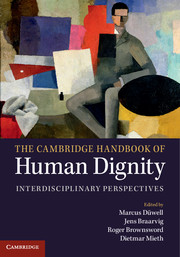Book contents
- Frontmatter
- Contents
- List of contributors
- Foreword
- Why a handbook on human dignity?
- Acknowledgments
- 1 Human dignity from a legal perspective
- 2 Human dignity: concepts, discussions, philosophical perspectives
- Part I Origins of the concept in European history
- Part II Beyond the scope of the European tradition
- Part III Systematic conceptualization
- Part IV Legal implementation
- Part V Conflicts and violence
- Part VI Contexts of justice
- Part VII Biology and bioethics
- 57 The threefold challenge of Darwinism to an ethics of human dignity
- 58 On the border of life and death: human dignity and bioethics
- 59 Human dignity and commodification in bioethics
- 60 Dignity only for humans? A controversy
- 61 Dignity only for humans? On the dignity and inherent value of non-human beings
- 62 Human dignity and future generations
- Appendix 1 Further reading
- Appendix 2 Universal Declaration of Human Rights
- Index
- References
57 - The threefold challenge of Darwinism to an ethics of human dignity
from Part VII - Biology and bioethics
Published online by Cambridge University Press: 05 March 2015
- Frontmatter
- Contents
- List of contributors
- Foreword
- Why a handbook on human dignity?
- Acknowledgments
- 1 Human dignity from a legal perspective
- 2 Human dignity: concepts, discussions, philosophical perspectives
- Part I Origins of the concept in European history
- Part II Beyond the scope of the European tradition
- Part III Systematic conceptualization
- Part IV Legal implementation
- Part V Conflicts and violence
- Part VI Contexts of justice
- Part VII Biology and bioethics
- 57 The threefold challenge of Darwinism to an ethics of human dignity
- 58 On the border of life and death: human dignity and bioethics
- 59 Human dignity and commodification in bioethics
- 60 Dignity only for humans? A controversy
- 61 Dignity only for humans? On the dignity and inherent value of non-human beings
- 62 Human dignity and future generations
- Appendix 1 Further reading
- Appendix 2 Universal Declaration of Human Rights
- Index
- References
Summary
Many (such as Frances P. Cobbe) regard Darwin's Origin of Species as the final nail in the coffin of theism, and his Descent of Man as sounding the ‘[death] knell of the virtue of mankind’. Yet Darwin insisted that an evolutionary explanation of our moral sense in no way harms ethics; but, rather, gives it a surer foundation. The question of whether Darwin's insights can provide this foundation, or whether they are in fact harmful to ethics, is still discussed today. In what follows, I will look at a particular aspect of this debate, namely, the importance of Darwinism for a Kantian style of dignity ethics.
By ‘Darwinism’ I mean an evolutionary theory where natural selection is the central explanatory concept for the development of natural phenomena (including human beings and their behaviour). I will look at this as a scientific theory, not at evolutionary theory as an overall worldview. Some authors, such as Daniel Dennett, have tried to push evolutionary theory in this direction (as a worldview), and argued on its basis for a naturalistic metaphysics which would obviously not be compatible with dignity ethics (Dennett 1996). I will concentrate on the implications of the scientific theory alone.
- Type
- Chapter
- Information
- The Cambridge Handbook of Human DignityInterdisciplinary Perspectives, pp. 517 - 525Publisher: Cambridge University PressPrint publication year: 2014
References
- 1
- Cited by



